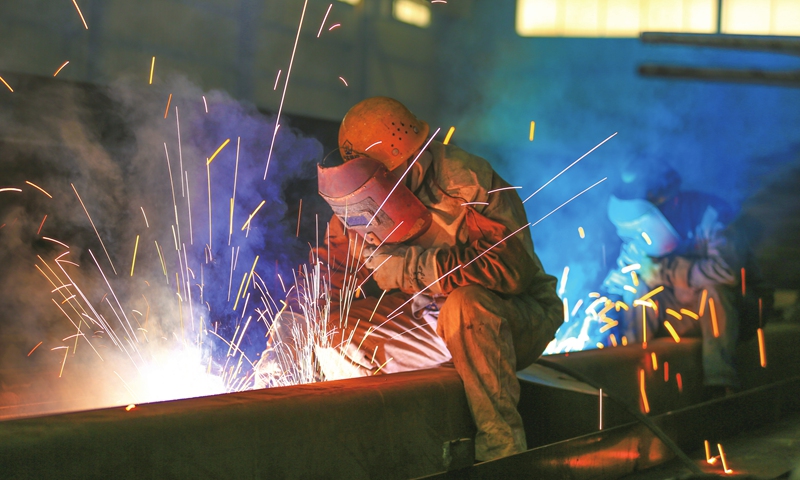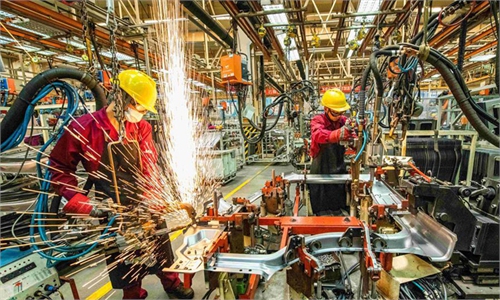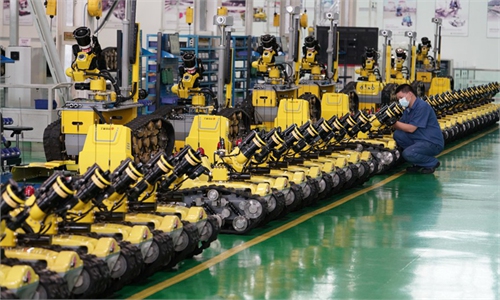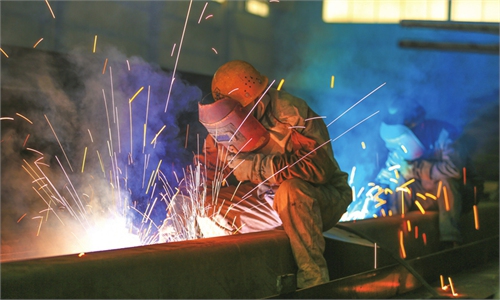
Employees of a metal materials company in Luoshe town, Huzhou, East China's Zhejiang Province weld a steel structure on January 20, 2022. As the Spring Festival approaches, companies in the town's industrial park are ramping up coronavirus containment while operating in full swing to ensure the completion of orders. Photo: cnsphoto
China' s industrial profits maintained their recovery momentum in the January-February period, thanks to the nation's financial support for the real economy, official data showed on Sunday, though companies continue to face looming headwinds.
Profits of China's major industrial firms with annual main business revenue of at least 20 million yuan ($3.14 million) rose 5 percent year-on-year in the first two months of 2022 to 1.16 trillion yuan, an acceleration of 0.8 percentage points from December, data from the National Bureau of Statistics (NBS) revealed.
Among the 41 industrial sectors, a total of 21 achieved year-on-year growth in profits, while 19 sectors posted declines. The energy raw material sector became a driving force for broader industrial profit growth. In the first two months, profits of the mining industry increased by 1.32 times on a yearly basis, significantly higher than the industrial average.
Profits of sectors such as crude oil and natural gas extraction, as well as coal mining and others, went up 1.57 times and 1.55 times year-on-year, respectively, driven by the soaring prices of commodities like crude oil and coal.
While profits at state-owned firms rose 16.7 percent, private firms saw a 1.7 percent drop in profits.
Zhu Hong, a senior statistician at the NBS, said that downstream enterprises, especially small firms, still face multiple difficulties and challenges, without a solid foundation for the continuous recovery of profitability.
"It should be noted that the profit growth rate of industrial enterprises has been significantly lower than that of last year due to the high base, while the cost pressure of enterprises has increased, and the profit margin and the level of connection between production and sales have declined," Zhu said.
In 2021, profits of China's major industrial firms surged 34.3 percent year-on-year. The full-year industrial profits were 39.8 percent higher than the 2019 level, putting the average annual growth for 2020 and 2021 at 18.2 percent.
Liu Xuezhi, a senior macroeconomics expert from the Bank of Communications, told the Global Times that affected by recent flare-ups of COVID-19 in multiple places across the country, China's economic growth is facing downward pressure, in particular for micro-sized and small businesses.
The NBS official said that the nation will continue ramping up efforts to ensure the supply and price of bulk commodities, effectively reduce the production costs of enterprises, especially mid-stream and downstream enterprises, and implement the manufacturing support policy and the tax and fee reduction policy for small and micro-sized enterprises.
China is set to boost its value-added tax (VAT) refunds in the latest tax and fee reductions to ease the burden on businesses and shore up the vitality of market entities, the Xinhua News Agency reported on Friday.
Total VAT refunds will reach approximately 1.5 trillion yuan this year, with priority given to micro-sized and small firms and the manufacturing industry, Vice Minister of Finance Xu Hongcai told a press conference on Wednesday.
Apart from the tax and fee cuts, micro-sized and small businesses need help in other areas. Due to their disadvantages in terms of industry access, business expansion and talent recruitment, it is necessary to strengthen corresponding policy guarantees and increase relevant reforms, according to Liu.
Global Times



